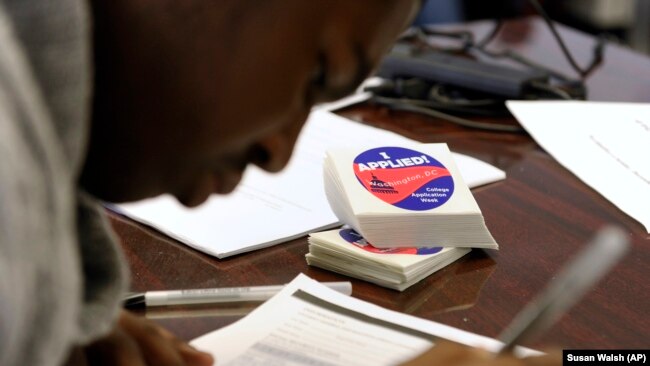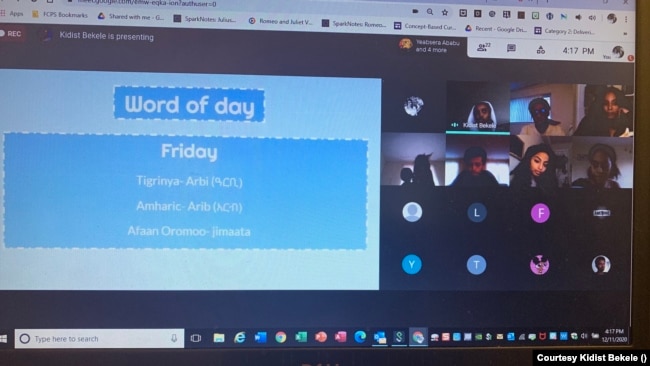コロナが変えた大学受験
大学選択、それは誰にとっても重要な事柄です。
去年、今年と、こんなにも教育の質について考えさせられた年はなかったように思います。当たり前と思っていたことが、いともたやすく壊れるんだって実感しました。
また、今回の記事で思ったのは、やはり課外授業、課外活動の人生への重要性です。
早速今日のVOAを聴きましょう!!!
個人的にDan Friedellのナチュラルなしゃべり方が好きです。
- パンデミックが学生の大学受験をどう変えたか
- 大学の名称と学年の呼び方
- How Pandemic Has Changed College Applications for Students
- Words in This Story
パンデミックが学生の大学受験をどう変えたか
How Pandemic Has Changed College Applications for Students
1 hour ago /2021/1/24
大学入学願書で最も重要なのは、学生の"課外活動"のリストです。
スポーツチームのメンバーであったり、家庭教師をしていたり、学校の演劇プログラムや歌のグループに参加している学生もいるかもしれません。中には、それらのすべてを行う生徒もいるかもしれません。
通常、この時期になると、アメリカの高校生は大学への出願を終えます。また、大学を訪問したり、SATのような入学試験を受けたりしています。
しかし、これは "ほとんどの年 "ではありません。
ほとんどの人が旅行をしていないので、学生はビデオでキャンパスツアーをしています。以前は学生と直接会って話をしていた大学が、代わりにビデオ通話で話をするようになりました。願書に加えて、大学は学生にビデオでの紹介を求めるようになってきています。いくつかの学校では、パンデミックがどのように自分たちの人生を変えたかについて書くように学生に求めています。
Kidist Bekeleの体験談
この10ヶ月間で人生が変わった学生の一人、18歳のキディスト・ベケレです。彼女はエチオピアで育ちましたが、現在はワシントンD.C.近くのバージニア州アナンデールに住んでいます。
彼女の願書には、9年生の時にアメリカに来た時のことを書いていました。ベケルは、エンジニアになりたいと言い、良い科学のクラスを提供する大学に行きたいと思っています。彼女は、この一年、ビデオを見ながら学校に通うのは大変だったと言っています、特に理科や数学の授業では、先生方の助けが必要になることが多いのです。
彼女はまた、大学への出願を助けることができる学校の大人のサポートを逃していました。自宅で願書を記入するのは簡単ではありませんでした。
「私は第一世代なので、両親はここ(アメリカ)の学校に行っていないので、FAFSAのような多くのことを記入する方法を知らなくて…それは非常に困難でした。でも、家族のことを考えると、母は職を失い、父は家族の中で唯一働いています。経済的にも大変だったけど、なんとか乗り切っているわ」
FAFSAは、連邦政府が学生にローンや補助金、その他の援助を受けることができるかどうかを調べるために使用する学資援助申請書です。
学生アドバイザーのローラ・ウェルズ
ローラ・ウェルズさんはアナンデール高校のアドバイザーの一人で、ベケレのような生徒の大学出願に協力しています。ほとんどの年、このプロセスは高校を卒業する1年前から始まります。11年生の時に小論文を書き始めます。そして次の年には願書の準備をするだけです。
ウェルズさんと彼女の生徒たちは、今年、願書の一部を仕上げようと急いでいます。10月には、自分の子供たちを寝かしつけてから、残りの夜は生徒たちとビデオ通話をして、願書作成の手伝いをしていたとウェルズさんは言います。
願書の作成は、ビデオ通話よりも直接会って行う方がはるかに簡単だと言います。ウェルズさんが一緒に仕事をしている学生の多くは、両親が米国市民ではありません。彼らは移民であり、”グリーンカード” として知られる永住権を持っています。そのため、ティーンエイジャーは願書に添付する書類を追加で提出する必要があります。
また、英語が十分に話せることを証明するために、追加のテストを受けなければならないこともあります。
「質問は非常に混乱するものです」とウェルズさんは言います。
パンデミックの影響で申請書の作成が困難になり、新しい活動に挑戦したいと考えている若い学生の機会が限られてしまったとウェルズさんは言います。
「彼らは今年、多くの新しいクラブや名誉協会に応募できることをとても楽しみにしていましたが、それらの多くは運営されていません。ですから、後輩たちは、より多くの活動に参加して履歴書を作成したいと思っていたのに、そのような機会がなかったことにフラストレーションを感じています。」
学生たちは、従来の”履歴書ビルダー”がなくても、自分たちの地位を向上させようとしています。ウェルズさんによると、あるグループはアムネスティ・インターナショナルのためのプロジェクトに取り組みました。別のグループは、アフリカの学生に読み物の教材を送る活動を組織しました。
ベケレは、彼女と東アフリカの友人たちがエチオピア・エリトリア協会を組織し、オンラインで会議を開いたと言います。
ウェルズさんは、学生がクラブに入ったり、グループ活動に参加できなくても、アメリカの大学に自分の能力をアピールする方法はあると言います。
学生は、自分の学校では受けられなかった科目について、アメリカの大学から無料でオンライン授業を受けることができます。これらの授業は自由時間に行うことができます。課外活動は、出願を検討する人たちに差をつけることができます。
「大学はあなたが学習に情熱を持っていることを見たいと思っています。彼らはあなたが率先して学習するのを見たいのです、でしょう?自分が持っている領域で出来る、どんなスキルであっても開発すること、それを明確にした上で、学習への情熱、自分自身や周りの世界への気づきを示すことができれば、それこそが大学にとって本当に重要なことだと思います。そして、それがどのような形であろうと、本当に重要なことではありません。」
パンデミックはまた、何人の学生を受け入れるべきかについて、カレッジや大学を心配させました。ワクチンができるまで大学進学を先延ばしにしている学生もいます。その結果、多くの小さな大学は十分な学生がいないのではないかと心配しています。そのような大学では、学生が出願しやすく、入学を許可されやすいようにしています。
ハーバード大学のような難関大学は、学生が多すぎるのではないかと心配しています。昨年、合格した学生の中には1年待つことにした人もいました。今年、ハーバードは早期入学希望者の約7%にしか合格をオファーしていない。昨年は、早期入学希望者の約14%を受け入れていました。
ベケレは、来年出願書類を作成する学生にこうアドバイスします。
「大学に進学して何か大きなことをすることを考えるとき、成績だけではなく、学校以外の活動にも参加するようにしましょう。それは成績だけではありません。そうそれが私が失ったものです。私はしなかったのです。そういう情報を得ることができなかったのです。」
大学の名称と学年の呼び方
ごぞんじの方も多いでしょうが、ご紹介します。
college と university
まずは、ここでも出てきましたが、college と university 。
必ずとはいえませんが
University は学士号、修士号、博士号などの大学院課程があり、規模が大きいです。
College は大学院課程がなく、規模が小さいことが多いです。
Boston College や、Dartmouth College などは、条件を満たしていても、伝統があるので変えていないようです。
学年の呼び方
大学一年生:freshman(1st year)
大学二年生:sophomore (2nd year)
大学三年生:junior (3rd year)
大学四年生:senior (4th year)
ちなみに、ご存じのように
小学一年生 1st grade に始まり
高校3年生 12th grade になりますね。
How Pandemic Has Changed College Applications for Students
 A student at Roosevelt High School in Washington, DC fills out a college enrollment application. President Barack Obama’s goal is that by 2020, America will again have the highest proportion of college graduates in the world.
A student at Roosevelt High School in Washington, DC fills out a college enrollment application. President Barack Obama’s goal is that by 2020, America will again have the highest proportion of college graduates in the world.
One of the most important parts of a college application is a student’s list of “extracurricular activities.”
A student might be a member of a sports team, spend time tutoring younger children or taking part in a school’s theater program or singing group. Some students might do all of those things.
Usually at this time, American high school students are finishing their college applications. They are also visiting universities and taking admissions tests like the SAT.
But this is not “most years.”
Since most people are not traveling, students are taking video campus tours. Universities that used to talk to possible students in person are doing so by video call, instead. Along with written applications, universities are asking students to send video introductions. Some schools asked students to write about how the pandemic changed their lives.
Kidist Bekele’s story
One student whose life is different over the last 10 months is 18-year-old Kidist Bekele. She grew up in Ethiopia but now lives in Annandale, Virginia, near Washington, D.C.
On her application, she wrote about what it was like coming to America in 9th grade. Bekele said she wants to be an engineer and is hoping to go to a university that offers good science classes. She said attending school over video most of the last year has been hard, especially in science and math classes that require a lot of help from teachers.
She also missed the support of adults at her school who could help with college applications. Completing her application at home was not easy.
“I’m first generation so my parents did not go to school in here [the U.S.] so they don’t know how to fill out a lot of things, like the FAFSA…That have been very hard. But and also, family-wise, my mom lost her job and my dad is the only one who works in our family. So financially, it was also kind of hard, but I’m getting through it.”
The FAFSA is a financial aid application used by the federal government to find out if students may receive loans, grants or other aid that can help pay for college.
Student advisor Laura Wells
Laura Wells is one of the Annandale High School advisors who works with students like Bekele on their college applications. In most years, the process begins one year before students complete high school. They start writing their essays in 11th grade. Then the next year, they only have to prepare the application.
Wells and her students are hurrying to finish some parts of their applications this year. In October, Wells said, she put her own children to bed and then spent the rest of the night making video calls with her students so she could help with their applications.
She said it is much easier to do work on an application in person than on a video call. Many students Wells works with have parents who are not U.S. citizens. They are immigrants and have a Permanent Resident Card, sometimes known as a “Green Card.” As a result, the teenagers need to provide additional documents to include with their application.
Sometimes they have to take an extra test to prove they can speak English well enough.
“The questions are so confusing,” Wells said.
The pandemic made it hard to complete the applications and Wells said it limited opportunities for younger students who wanted to try new activities.
“They were really looking forward to being able to apply to a lot of new clubs and honor societies this year. And a lot of those are not operating…So the juniors are frustrated because they were really excited to get more involved and build those resumes and they just haven’t really had the opportunity to do that.”
Students are still trying to improve their standing even without traditional “resume builders.” Wells said one group worked on a project for Amnesty International. Another organized an effort to send reading materials to students in Africa.
Bekele said she and her friends from East Africa organized an Ethiopian and Eritrean Association and held meetings online.
 Kidist Bekele grew up in Ethiopia and moved to Virginia as a teenager.
Kidist Bekele grew up in Ethiopia and moved to Virginia as a teenager.
Wells said even if students are not able to join clubs or get involved in group activities, there are still ways to show American colleges their abilities.
Students can take a free online class from a U.S. university in a subject that they could not take at their own school. They can do these classes in their free time. Extra activities can make a difference to the people who consider applications.
“Colleges want to see that you’re passionate about learning. They want to see that you take initiative of your learning, right? To develop whatever skills it is you can develop in the space that you have…If you can articulate that and still show that passion for learning, that awareness of yourself and the world around you, I think that’s what’s really important to colleges. And the particular form that that happens to take doesn’t really matter.”
The pandemic also made colleges and universities worried about how many students to accept. Some students are putting off college until a vaccine is available. As a result, many small colleges are worried they may not have enough students. Those colleges are making it easier for students to apply and to be accepted.
Other universities that are difficult to get into, like Harvard, are worried that they may have too many students. Last year, some students who were accepted decided to wait a year. This year, Harvard offered acceptance to only about seven percent of early applicants. Last year, the school accepted about 14 percent of its early applicants.
Bekele offered this advice to students who will be filling out their applications next year.
“When you look at going to college and doing this big things, it’s not only about your grades, try to participate in other activities outside of your school. It’s not only about your grade. So that’s what I lost. I didn’t do. I couldn’t get those kind of information.”
_______________________________________________________________
Words in This Story
extracurricular –adj. used to describe extra activities (such as sports) that can be done by the students in a school but that are not part of the regular schedule of classes
tutor –v. to teach a single student
grant –n. an amount of money that is given to someone by a government, a company, etc., to be used for a particular purpose (such as scientific research)
confusing- adj. difficult to understand
resume- n. a short document describing your education, work history, etc., that you give an employer when you are applying for a job
passionate- adj. having, showing, or expressing strong emotions or beliefs
initiative- n. the energy and desire that is needed to do something
particular- n. a specific detail or piece of information
articulate –v. to express ideas clearly and effectively
participate- v. to be involved with others in doing something : to take part in an activity or event with others